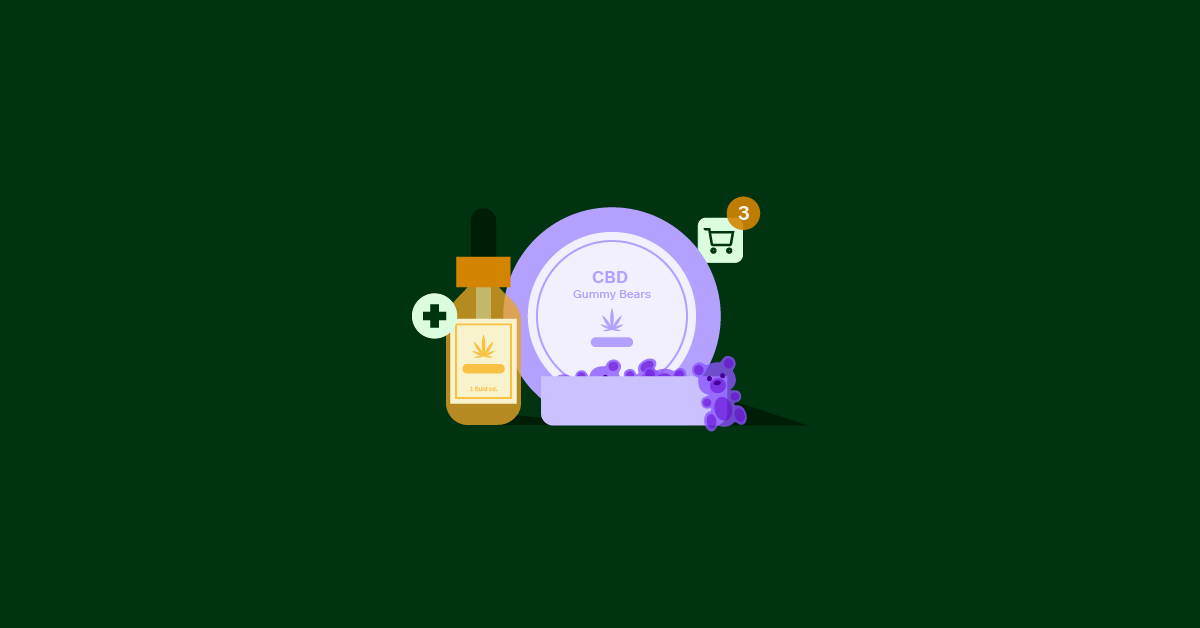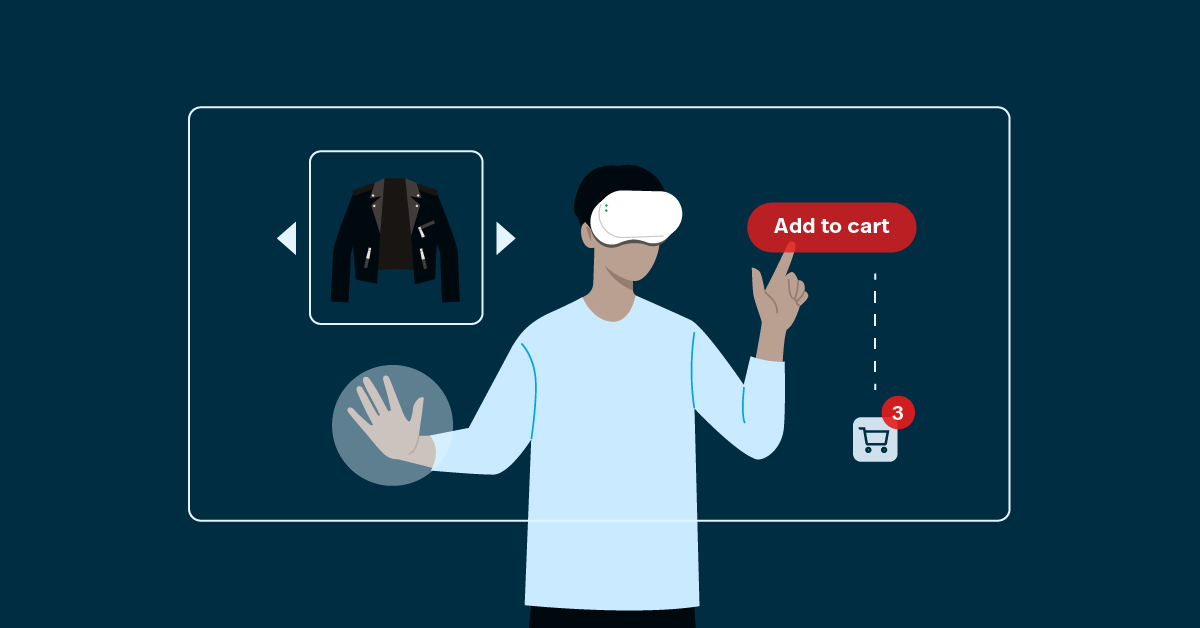
Small businesses employ millions of professionals across dozens of industries. Every year, new companies open their doors and provide jobs to help drive their local economies. However, not all small business ideas are right for every moment.
In 2023, you’ll need to be prepared to adapt to shifting customer expectations, global conditions and economic realities. If you’re thinking about starting a business this year, here’s what you need to know about the current small business landscape and the opportunities available.
- What’s considered a “small” business?
- How many small businesses are there in the United States and Canada as of 2022?
- How can I start a small business?
- What is a good business to start in 2023? (Featuring 20 small business ideas)
Prepare your business for the future of commerce
Download our free playbook and learn how to sell on different channels, boost loyalty and increase foot traffic with technology.
What’s considered a “small” business?
The SBA defines a small business as any company that either employs fewer than 500 employees or falls beneath a specific annual receipts cap.
Most small businesses in the U.S. are much smaller—the average small business employs 1 to 19 people.
How many small businesses are there in the United States and Canada as of 2022?
As of 2022, there are about 33.2 million small businesses operating in the United States and more that 1.28 million in Canada, which is a whopping 99.9% and 98.1% respectively of the total number of businesses in each country.
Small business owners employ 61.7 million people which make up almost half of the workforce in the US and 10.3 million in Canada, two-thirds of the workforce.
How can I start a small business?
So you’re ready to make being your own boss your full time job? Here’s what you need to do.
- Research your small business idea. Articles like this are a good start. Also make sure to research wider economic conditions and outlook and the general health and makeup of businesses in your area.
- Start planning your business. Download a business plan and start filling it out. Be as detailed as possible, and if you run into anything you don’t know the answer to, take the time to research it thoroughly. The more concrete your business plan, the stronger foundation you have to start your small business.
- Secure funding. Using your business plan, start approaching sources of funding, like banks and investors.
- Make sure the legal parts are covered. What certificates do you need? What permits? What laws should you be aware of? Start putting these in motion.
- Secure a location. If you’re opening a small business with a brick and mortar presence, you’ll need a location. You should have scouted some while making your business plan, so now that you have your funding, sign a lease.
- Get your business management software. If you’re opening up a retail store or charging for services, you’ll need a point of sale system. If you have employees, you’ll need payroll management. No matter what type of business you’re starting, you’ll need accounting software.
- Acquire inventory. Find wholesalers for small businesses from which to source your products and start contacting them. Expos and online supplier directors are great places to start.
- Build a team. If you’re just starting out, you may be able to run your business by on your own. But as things progress, you’ll nee to bring in in part-time or full-time employees. Make sure you research average wages in your area.
- Build your website. Having an online presence is crucial, even if you’re not planning to sell anything over ecommerce. Build a site and open your social accounts.
Want more advice? Check out our in-depth article to starting a small business here.
What small business idea is most profitable?
There isn’t one answer to this question. The most profitable business idea changes depending on the economic environment you’re in.
In an economic boom, profitable small businesses include luxury goods, travel and real estate.
In a recession, important services, essentials and repair and resale retail are more likely to be profitable.
No matter what, for a business to be profitable, the return needs to be higher than the investment. That doesn’t always mean a low investment is guaranteed to pay off—some of the most lucrative businesses require high initial capital.
However, businesses that require a high initial investment are always a higher risk. If you’re opening your first small business, a low investment business idea is probably going to be safer.
What businesses make a lot of money?
A business in a high-growth industry with low startup costs, less competition and a good long-term outlook is most likely to be profitable. Examples are financial services, personal services (like personal training or pet care), pet and baby supplies and well-positioned retail stores.
No matter the industry, profitable businesses are well run, in demand and with a cost of goods sold (or COGS) that doesn’t completely overpower revenue. A business without a lot of competition can fail, and a business with a ton of competition can out-compete the others.
If you want your business to make money, you need data.
Before you start your business, you need data about the economic climate, the demographics of where you want your business to be based, the outlook and tactics of competitors and the cost of supplies, technology and labor.
Once your business is open, you need your own data. For example, if you open a retail store, you can use tools like Lightspeed’s built-in reports and Advanced Reporting to monitor your sales, trends and margins. With that data in hand, you can make decisions about profitability instead of relying on anecdotes and educated guesses.
Without data, your small business might run into expensive potholes you never saw coming, and you might make decisions that aren’t in your best interest.
Which business is most profitable in future?
If you want your business to be profitable in the future, you need to be sure you’re innovating.
Again, this is where data is important. The way things have always been done isn’t always the best way. If you’re setting and measuring goals and key performance indicators, you can innovate and stay on top of what your customers need and how they’re evolving.
Let’s take financial services, for example. Everyone needs financial services, so it’s likely to still be a profitable industry in the future. But as more and more digital natives—people born after the internet took over our daily lives—grow up, how they interact with financial services will change. Is your financial services company equipped to serve clients online? If you want the best chance to be profitable in the future, it should be.
Be careful about fads and trends—they won’t always set you up for future profitability if you don’t address them properly.
Take the retail industry for an example. As concern for the environment grows, fewer shoppers want plastic in their goods. Right now, Vegan leather is a huge trend and is growing, which means it may be a good bet in this moment, but a lot of vegan leather is actually plastic. To ride the vegan leather wave now and into the future, it’d be best to carry vegan leather made from sources other than plastic. That way, you’re catering to current demand and future-proofing against growing consumer concerns at the same time.
Which business is most profitable for beginners?
If you’re a first time business owner, you’ll want:
- Reasonable startup costs. Every business has some startup cost, but there’s a difference between funding a small operation and funding a huge, specialized business. Keep in mind that startup costs should be reasonable, but not always as low as possible–forgoing a physical location might make it harder to get off the ground, and opting for pen-and-paper instead of a cloud point of sale system will just add extra work.
- Manageable overhead costs. Once a business is established, you’ll need the operating costs to be reasonable.
- Maximized inventory, if applicable. This doesn’t mean a lot of inventory. It means being smart about it—everything you order should be done with a strategy to sell it within six months (give or take depending on industry).
Examples of businesses that fit the bill are cleaning companies, online stores and/or dropshipping and pet services like grooming or walking.
What is a good business to start in 2023? 20 small business ideas you can try
While nothing is written in stone, in 2023, you’ll want to be prepared for continuing supply chain issues, slower economic growth and the ongoing shakeup of online and offline commerce.
Here are 20 small business ideas tailored to 2023.
1. Home improvement services
In 2020, the real estate market saw its highest pace of growth since 2005. While the housing market has since slowed down, all those new homeowners still want to fix up their homes, which creates a demand for home improvement services. New homeowners may not have the skillset or expertise to make their renovations a reality, and look to hire a professional to help get the job done.
Home improvement services could include anything from interior design, carpentry, contracting, plumbing or landscaping. Most of these areas require training and access to equipment or materials, so the startup costs are not the cheapest. This type of business also may be more popular in certain geographic areas than others (i.e. wherever people are buying homes most readily).
2. Cleaning services
Cleaning services offer essential opportunities to both residential and commercial properties, helping to manage tasks many people do not enjoy or do not have time to complete. These services can function as home-based support one or more times per week, or as a daily resource for commercial operations. With average rates of $18 to $35 per hour, cleaners bring in substantial revenue for simple, yet necessary services.
Due to the nature of a cleaning service—no physical office is required, equipment costs are low and can be billed back to the client and hours of operation are flexible—enterprising entrepreneurs can see significant success in building a company in this industry.
3. Tutoring services
School is always in session, and remote education has created unique challenges for students of all ages. Starting a tutoring service is a great way to help those struggling with core concepts or gain further mastery in a specific area. Here’s a sample list of the subject areas that your tutoring business could specialize in:
- SAT/ACT prep
- College essay prep
- English
- Sciences (biology, chemistry, physics)
- Foreign languages
- Mathematics
- History
- Computer science
Thanks to video software, there’s no need to hold lessons in person—all you need is a phone, tablet or computer, making the startup costs for this type of business very low. Depending on your location and level of education, your tutoring service could charge anywhere from $25 to $56 an hour.
4. Personal training and fitness instructors
Gyms and indoor fitness centers were largely impacted by mandated COVID-19 shutdowns, but the fitness industry proved to be adaptable and resilient. Fitness instructors and customers alike have shifted to online and outdoor classes to stay healthy and active, even as the world has reopened. The shift to remote and hybrid work has also created a need for exercise like never before.
While specific fitness trends come and go, the need for fitness trainers and quality content stays constant. The U.S. Chamber of Commerce recommends that personal trainers can reach customers and build a following through digital platforms like YouTube, TikTok, IGTV and Instagram Live. Trainers can use social media to find clients to create customized workout programs for, at their desired cost.
Getting started in personal training can be fairly simple. You can take a formal certification exam, or in some cases, just being a self-taught fitness nerd is enough to break into the industry.
5. Delivery services
As a result of the pandemic, more people are staying at home in order to stay safe. That means that delivery services have grown tremendously; online food delivery services alone are expected to grow by more than $104 billion by 2023.
To ride this wave, you could offer your own local courier service to deliver groceries, medications or run other essential errands. In addition to charging a standard rate, you could charge additional fees for lengthier deliveries, rush orders or delivering heavy or bulky items.
6. Baby supplies
No matter the economic outlook, babies need clothes and supplies, and children need child care. Even when spending decreases in other areas, spending on children doesn’t slow down at the same rate. That means if you want to open a retail store, baby supplies might be the right bet.
You don’t need any formal training to open a retail store or sell online, but you do need the right tools. For a baby supply store, that’d include loyalty programs to help parents save when they pick you over the competition.
7. Pet store
The pet store industry grew to $261 billion in 2022, and is on track to hit $350 billion globally by 2027. As more and more people adopt pets (70% of American households have pets, up from 56% in 1988), more people will need pet supplies.
Opening and running a pet store is a lot like a baby supply store. Pet owners will appreciate loyalty programs to save when they shop with you, which will help you build a loyal customer base for your new small business.
8. Digital marketing services
With more businesses setting up shop online, there’s a growing need for digital marketing services. To help small businesses build their brand and digital presence online, you can create your own digital marketing agency. A digital marketing agency typically offers one or more of the following services:
- Copywriting
- SEO writing
- Help with paid social media advertising
- Web design
- Web development
- Brand/creative consulting
- Content creation
- Organic social media management
Anyone can start a digital agency, regardless of their educational background. Running an agency is easy to do from a home office, so there are very little startup costs for starting this type of business. You can run an agency as a solopreneur, or hire people that have expertise in the areas you’re less solid in.
9. App development
Businesses are looking to go digital, and some may even seek to build their own apps to reach customers. App developers can help businesses make their visions a reality by building a custom iPhone or Android app.
App development doesn’t require a formal degree, but prior training and experience building apps are important to have if you’re planning to break into the field. There are coding bootcamps and free online courses that can help you learn the fundamentals and get started.
10. Alcohol and liquor store
Alcohol is a pretty sure bet. It has year-round demand and sales don’t drop off during recessions. Online alcohol sales are on the rise, too, so you can build the ecommerce side of your business.
However, opening a liquor store has a few extra hurdles compared to your average retail store. You’ll be considered a high-risk merchant, so you can’t work with all payment processors, though you’ll still need one—shoppers like their credit cards, after all. And you’ll need to be sure you have systems to check IDs and report taxes correctly.
Even with these concerns, alcohol is a growing industry, hitting $1.17 trillion in 2021.
11. Accounting services
Individuals and businesses alike rely on accounting services every year to file tax returns, and assist with bookkeeping and financial planning. This consistent, reliable demand for services is definitely a pro if you’re looking to start a business. There are very minimal overhead start-up costs for accounting, and the job is easily doable from home.
However, the barriers to entry for accounting are quite high. Accountants usually have at least an undergraduate degree, and some may have a CPA license or an IRS Enrolled Agent certification. Accounting professionals with more advanced qualifications can charge higher rates and generate more revenue as a result.
12. Fashion resale
While sales of new apparel rise and fall with economic conditions, the popularity of fashion resale is on the rise. Second-hand retail was already growing in popularity before the pandemic, and subsequent supply chain struggles and desires for deals only helped.
With a projected 127% growth by 2026—eight times faster than the overall apparel marketing in North America—if you want to open an apparel store, you should be considering fashion resale. It’s a good bet in both weaker and stronger economic conditions, thanks to discounts and a desire for sustainable fashion.
To start a fashion resale company, you’ll need a business license, some initial stock and a venue for sales—that could be online, your own brick and mortar or a spot in a marketplace. That means the financial barrier to entry can vary.
13. Bike store (with repairs)
More and more people are picking up their bikes. Hobbyists and serious cyclists both are driving growth globally. That means if you want to open a retail store, you might consider a bike store.
Specifically, consider a bike store that offers repairs, as repairs future-proof your business for good and bad times. People are less likely to want to buy new when the economy is slow, and more likely to hold onto their existing equipment. That means if you offer repairs, they can come to you.
14. Auto parts and repairs
At some point, every car needs a little maintenance.
Auto parts and repair shops are particularly well-positioned for economic downturns as people hold onto cars longer. That means good or bad, you might have luck with an auto parts shop.
You’ll need robust inventory management if you start this small business. With all the possible parts you could carry or order in for your customers, you don’t want anything to go uncounted. Make sure you have a point of sale that can handle that inventory from day one.
15. Electronics repair
Seeing a pattern?
Repair shops help people hold onto their devices, and electronics repair is no different. With right to repair laws advancing, more customers will be able to get their phones fixed instead of trading them in for new ones—even Apple is making it easier.
While there are no formal certifications needed to open an electronics repair store, you still need to know how to do it (or you need to hire people who do). You might want to take a course in electronics repair before opening this business.
16. Dental offices
Dental health is an important part of overall wellness and self-care, with preventative appointments recommended twice a year for the average American.
The dental industry offers room for success for those with the right qualifications. Dentists must earn both a bachelor’s degree and a doctorate in dentistry, and most dental hygienist roles require a minimum of two years of school. Dental equipment can be expensive as well, with chairs alone costing $2,000 or more.
However, dental procedures are often expensive, with the average cleaning costing $288 and added costs for fillings, x-rays, extractions, and root canals. Your dental practice could earn substantial profits from common treatments.
17. Candy store
This sweet idea could be your ticket to small business success. Candy has a history of thriving in uncertain times, like Cadbury’s record earnings in 2008.
Candy stores are great for experiential retail. You can hold candy making classes and showcase the candy making process on the shop floor to entice customers. As more people want to be entertained when they shop, a candy store could be the answer.
18. Warehouse and Storage
The U.S. is expected to need another 1 billion square feet of warehouse storage by 2025. This means that having ample space to store goods and possessions brings compelling business opportunities.
Building a warehouse can cost anywhere from $24,000 to more than $800,000 depending on the size, this can be offset by rental revenue once you open for business. In many cases, renting warehouse space can be fairly hands-off; clients pay rent and are then free to store their items. This means that the time commitment in a warehouse business is minimal.
19. Discount store
Shoppers love a good deal. Discount stores dominated the market in 2022 and are unlikely to slow down in 2023.
You have room to be creative in this category. Do you want to open an independent dollar store? A liquidation store? What about discounted used inventory? Or discounted food?
Do some research on your area to determine the best fit. Once you’ve got your idea, make a plan for how you’ll acquire inventory. Will you work with wholesalers offering discounted goods, or will you buy damaged and unsold inventory from other retailers?
20. Dropshipping
Finally, there is dropshipping, the ultimate side business and one of the most popular small business ideas.
Dropshipping is the practice of opening up an online store and offering products for sale, but never physically stocking the item yourself. You interface with the wholesaler, and the wholesaler ships the product to the customers.
Dropshipping saves on inventory storage costs, as well as shipping fees. You just need an online store to get started.
However, dropshipping is competitive—a lot of people are selling online, and a lot of them could be selling the same things you are. If you want to go this route, make sure you have other unique selling points (or USPs) to ensure customers pick you. Like with baby supplies and pet stores, a strong loyalty program might be the seller here.
Positioning your small business for profit
There are many ingredients to a successful small business idea: a good plan, powerful POS tools, business savviness, experience, etc.
While no industry is a guaranteed success, those that are flexible, resilient, in high demand and with good margins are a solid bet. This list of small business ideas is a starting point to get you inspired this year.
If you’re inspired to open a business and you’re looking for a POS that will work with you every step of the way, let’s chat!
Editor’s note: Nothing in this blog post should be construed as advice of any kind. Any legal, financial or tax-related content is provided for informational purposes only and is not a substitute for obtaining advice from a qualified legal or accounting professional. Where available, we have indicated the first-hand sources of the information contained in this blog post. While we strive to provide accurate content, we cannot be held responsible for any actions or omissions based on such content. Lightspeed does not undertake to complete further verifications or keep this blog post updated over time.

News you care about. Tips you can use.
Everything your business needs to grow, delivered straight to your inbox.




